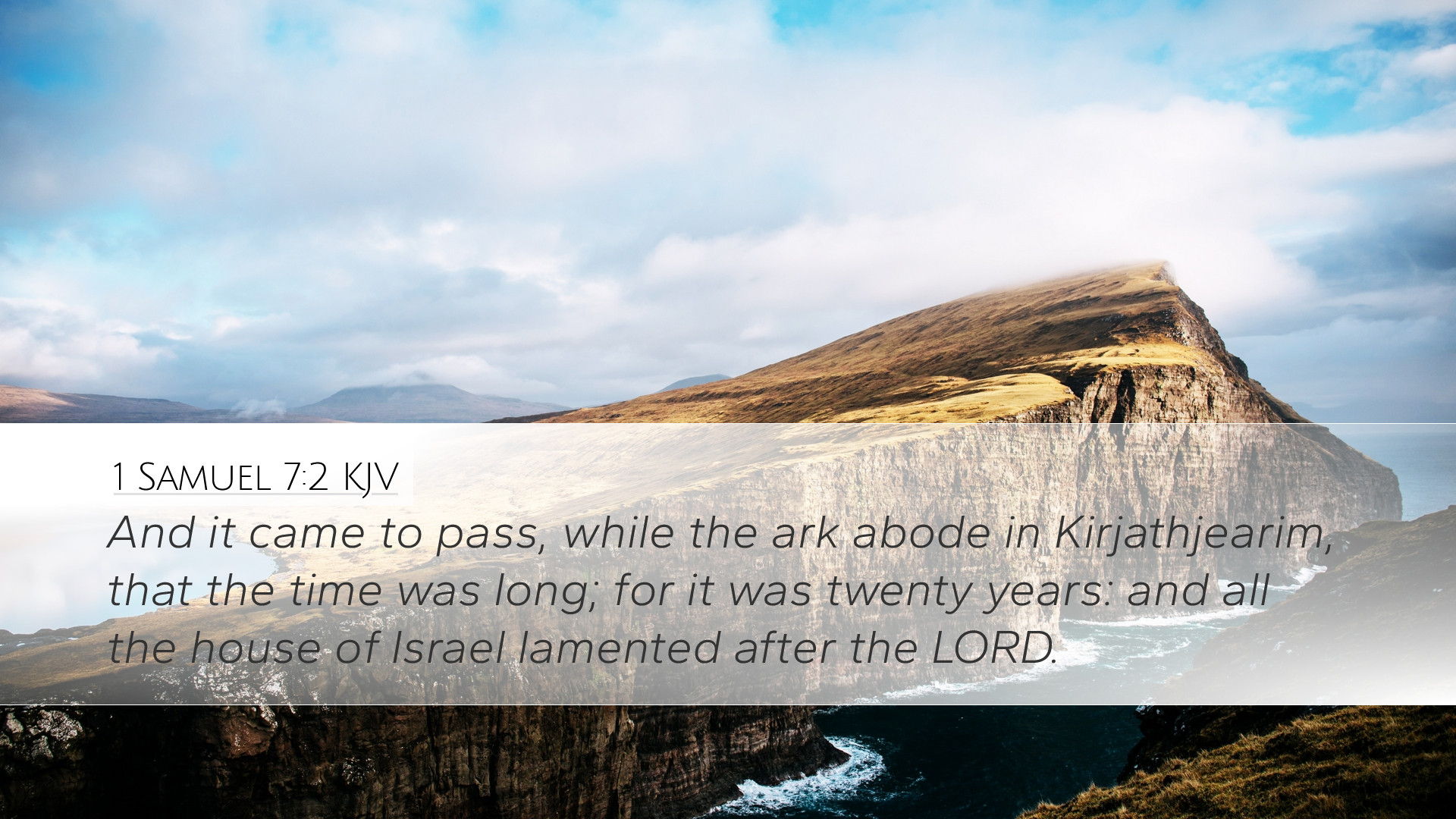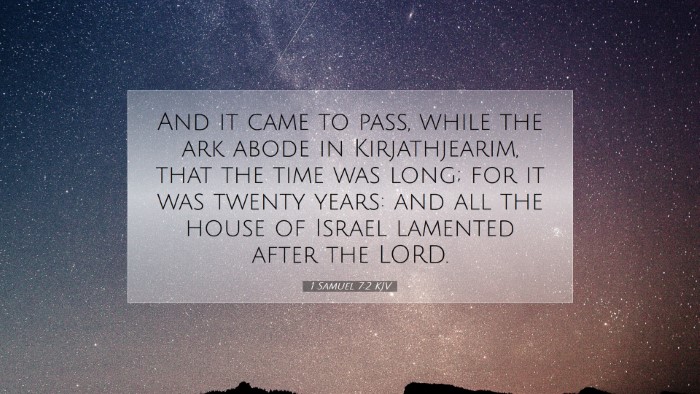Commentary on 1 Samuel 7:2
Verse Context: 1 Samuel 7:2 records the significant moment when the people of Israel turned back to God after decades of idolatry and oppression. This verse sets the stage for Israel's restoration and the renewal of their covenant relationship with Yahweh.
Verse Text
“And it came to pass, while the ark abode in Kirjath-jearim, that the time was long; for it was twenty years: and all the house of Israel lamented after the LORD.” (1 Samuel 7:2)
Historical and Theological Background
The context of this verse is critical to understanding its theological implications. The Philistines had captured the Ark of the Covenant, the symbol of God's presence among His people. After a series of devastating events, the Ark was returned and housed in Kirjath-jearim. This period of twenty years during which the Ark remained there was one of reflection, sorrow, and anticipation for God’s intervention.
Insights from Matthew Henry
Matthew Henry emphasizes the significance of Israel’s lamentation for the Lord during this era. He observes that Israel's spiritual state deteriorated due to their idolatry and neglect of God’s commands. The sorrow expressed by the people was a sign of their recognition of sin and desire for divine restoration. He notes that true repentance involves not just feeling remorse but a heartfelt turning back to God, which prepares the way for future blessings.
Insights from Albert Barnes
Albert Barnes interprets the verse in light of Israel’s national identity and covenantal relationship with God. He points out that the lengthy absence of divine favor prompted lamentation among the people. This strife and oppression acted as a catalyst for the coming revival under Samuel's leadership. Barnes highlights that the longing for God characterizes true Israel: a people constantly forward-looking for God’s intervention and presence.
Insights from Adam Clarke
Adam Clarke brings attention to the timeline specified in the verse, noting the remarkable patience displayed by the Israelite community. He suggests that the twenty years symbolize a transition period, where Israel had to endure the consequences of their sin before experiencing restoration. Clarke sees the “lamenting” as an act of collective worship and introspection, indicating a deep longing for restoration. This anticipation suggests a communal acknowledgment of need for divine grace.
Thematic Reflections
The themes emerging from 1 Samuel 7:2 revolve around the concepts of repentance, restoration, and the longing for God’s presence:
- Repentance: The lamentation of Israel signifies a heartfelt sorrow for their separation from God. This aspect is crucial for any revival, as demonstrated in Israel’s history.
- Restoration: The verse foreshadows the forthcoming restoration under God’s guidance, precursing significant events led by Samuel which include the gathering of the people for repentance and prayer.
- Community Lamentation: The collective mourning illustrates the unity required in returning to God, a vital insight for congregational studies and ecclesiology.
- Hope and Anticipation: As the people lament, they also demonstrate hope for God’s mercy, reassuring us that acknowledgment of sin inevitably leads back to divine grace.
Application for Today’s Readers
For modern believers, 1 Samuel 7:2 serves as a powerful reminder of the importance of community in spiritual renewal and the need for collective awareness of sin. Pastors, theologians, and students should reflect on the following:
- Collective Responsibility: Just as the Israelites lamented together, today’s believers are called to collectively confront societal sins and seek God’s forgiveness.
- Importance of Spiritual Leadership: Samuel’s role as a prophet and leader emphasizes the necessity of appointed leaders in directing a community towards repentance and renewal.
- Cultivating a Culture of Lament: Understanding the value of lamenting sin can cultivate a deeper, more authentic relationship with God, leading to healing and restoration.
- The Power of Hope: Reflecting on the goodness of God amid trials can foster resilience in the face of spiritual drought in our lives and communities.
Conclusion
The verse stands as a significant moment in Israel’s history and illustrates key tenets of faith that remain relevant. The response of the Israelites teaches modern believers about the cyclical nature of sin, sorrow, and restoration, emphasizing that the path back to God begins with genuine lamentation and a unified longing for His presence. Indeed, as observed through the insights of Henry, Barnes, and Clarke, 1 Samuel 7:2 calls us to embrace both our need for repentance and the boundless grace offered by God.


